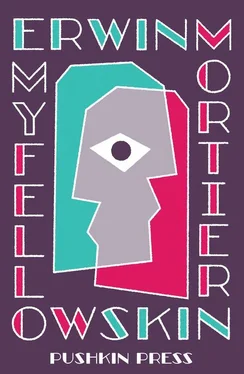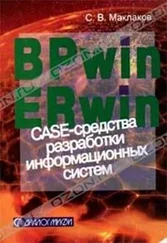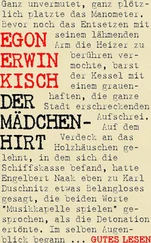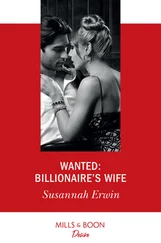Erwin Mortier - My Fellow Skin
Здесь есть возможность читать онлайн «Erwin Mortier - My Fellow Skin» весь текст электронной книги совершенно бесплатно (целиком полную версию без сокращений). В некоторых случаях можно слушать аудио, скачать через торрент в формате fb2 и присутствует краткое содержание. Год выпуска: 2015, Издательство: Pushkin Press, Жанр: Современная проза, на английском языке. Описание произведения, (предисловие) а так же отзывы посетителей доступны на портале библиотеки ЛибКат.
- Название:My Fellow Skin
- Автор:
- Издательство:Pushkin Press
- Жанр:
- Год:2015
- ISBN:нет данных
- Рейтинг книги:4 / 5. Голосов: 1
-
Избранное:Добавить в избранное
- Отзывы:
-
Ваша оценка:
- 80
- 1
- 2
- 3
- 4
- 5
My Fellow Skin: краткое содержание, описание и аннотация
Предлагаем к чтению аннотацию, описание, краткое содержание или предисловие (зависит от того, что написал сам автор книги «My Fellow Skin»). Если вы не нашли необходимую информацию о книге — напишите в комментариях, мы постараемся отыскать её.
My Fellow Skin — читать онлайн бесплатно полную книгу (весь текст) целиком
Ниже представлен текст книги, разбитый по страницам. Система сохранения места последней прочитанной страницы, позволяет с удобством читать онлайн бесплатно книгу «My Fellow Skin», без необходимости каждый раз заново искать на чём Вы остановились. Поставьте закладку, и сможете в любой момент перейти на страницу, на которой закончили чтение.
Интервал:
Закладка:
The human body does what it is programmed to do with quiet purpose, it brooks no contradiction. It grows, provides ready-furnished rooms for you to inhabit and make your own, whether you like them or not. Had he been punier, he’d have played the piano, loved Liszt and fought hard not to weep during the Lacrimosa . Had I been heftier, I’d have shot thrushes out of the cherry tree and wrung their necks when they fell to the ground, without flinching, just for the heck of it.
I remember the day he discovered a litter of kittens, a few weeks old. Cats were a plague in the empty stables. He smashed their skulls one by one with a heavy chisel. I turned away so as not to vomit. When it was all over he stood with bloody hands looking down at the mess of split skulls and bulging eyes without a trace of pity, rather with interest, as if this were just another demonstration of how little death meant.
One day he found a woodcock in the orchard, caught in a length of barbed wire. He spent the entire Wednesday afternoon searching cellars and pantries for a suitable bottle, and subsequently for a cork that fitted tight. He filled the bottle with sand and tied a piece of string around the neck at one end and around the bird’s legs at the other, after which he made for the bridge over the canal.
When he got there he leaned over the railing and saluted as he dropped the bird into the water.
For the next few days he kept saying, “Must be rotting nicely down there. Unless the rats got to it first.” The grim satisfaction in his voice sent shivers down my spine.
*
The older a photograph, the less familiar the people in it will appear, but for me, curiously enough, it works the other way round. Aunt Odette’s albums — she was already pasting in photographs before my father was born — transport me directly to the frozen clamour of family gatherings long ago. Quite who is being congratulated or mourned in the shade of the beech tree, the same place where my father would set up the folding table when I was a boy, makes little difference. It is the same happiness, the same sorrow, passing through an ever-changing array of figures. Whether anniversary or funeral, whether the garden is festooned with flags or with black draperies, the lawn breathes the calm, domesticated atmosphere that goes with the dead long since laid to rest.
Dried edelweiss. Snow-capped mountains. Aunt Odette in a long dress by the lake at Geneva, brimming with expectations as yet unsoured. In Cologne, by the Cathedral, and on the steps of the Sankt Gereon as yet undevastated by war, carrying her jacket over her arm, her eyes shaded by the brim of her little hat.
The towers of Prague (a thousand times lovelier than Vienna) viewed from the Charles Bridge. The banks of the Vltava. Unter den Linden. The Champs Elysées. Standing by a hotel entrance, Aunt Odette looks happy, as though expecting the offer of a gentleman’s arm. The motor cars she gets in and out of are benign, glossy beetles. Time seems to have been differently organised then, with minutes still being minutes, but in less of a hurry. The figures peopling those busy boulevards seem always to be strolling, heading nowhere in particular. Aunt Odette must have felt herself in an ocean of time, standing on the deck of a royal steamship without a single sandbank or iceberg in sight.
Here she has posted herself beside the front door, unaware of Flora and Alice in the doorway with their arms around each other, puffing up their cheeks and sticking out their tongues. The next snapshot shows her dismay at catching the girls poking fun at her. Then there is a third picture, in which the three of them pose side by side trying not to laugh, for being photographed was not to be taken lightly in those days.
*
In that final photo of us on the monastery steps, taken on the day our school diplomas were awarded, it is not as sunny as the day when my father posed there. Willem and I are both grinning from ear to ear.
Our collars itched. I felt I was being slowly throttled by my tie. The ceremony was accompanied by string music in the refectory. Our priestly principal was in such good humour that he resembled a well-fed blue tit fluttering this way and that on the podium, so beside himself with pride that he almost lost his balance.
One lad was taking mathematics at university, another would be reading economics. The priest fiddled blissfully with the lapels of his jacket, not without relief, I suspect, that the good name of the school had survived the year untarnished.
Mr Bouillie, in a rush of uncharacteristic geniality, proposed drinks at the Christian community centre on the square, for some man-to-man talk for a change. Willem and I did not join them. Directly after the official presentation we leapt on our bikes and made for the woods. We very nearly flung our diplomas into a ditch out of sheer bravado. To shed all excess baggage.
We soared in the June air. The caprices of spring were over. Now was the time for sprinklers tapping out their steady circular showers on rich people’s lawns. Whooping for joy, Willem swerved crazily on his bike across the road in an attempt to force me into the verge.
Of the pair of us, I was the more dutiful. I was the one who stopped at crossroads, I hardly ever ignored a red light and always stuck out the correct arm to signal a left or right turn.
“Did you pass?” his mother cried from the carport when she heard us come in.
“Passed!” we shouted in unison.
Loud kisses were planted on our cheeks. Katrien came down briefly, a little downcast because she still had her piano exam to do later in the day. Arpeggios draped themselves like feather boas around our shoulders.
Out on the terrace, under the awning, Willem’s father popped a bottle of champagne and raised his glass in a toast.
“Here’s to our diploma!” Willem yelled. “To freedom!”
“And to the future,” said his father.
History was certainly an interesting choice, everyone agreed, but the fact that Willem had chosen to study medicine made them visibly proud.
“I might even get rid of that ache in my shoulder,” his mother joked.
“Not if it’s cancer,” Willem laughed, “I expect it’s terminal.”
Heady with wine, she gave him a few playful slaps, then made for the kitchen to baste her joint of beef.
*
We went to Ghent together to hunt for student lodgings. We were in this together, but not entirely. Willem thought we’d distract each other too much if we shared a flat. I was put out at first and then agreed with him.
We found a place for me in an old town house by the River Schelde, close by the university. The ground floor, a neo-baroque showcase stuffed with sombre armchairs, was the domain of the elderly landlady, Miss Lachaert, who seemed to be constructed of floor-sweepings tied together with a little apron of felt.
She circled all around me, shuffling in her quilted slippers, then put her enormous glasses on her nose and scrutinised me at length, as if my entire life were written in neat paragraphs across my forehead for her to read.
“No visitors after ten p.m.,” she said finally. “And the first time you have female company will be the last.”
“Have no fear, Madam,” Willem said innocently. “He’s far too serious for girls.”
She handed over a key. Third floor, second door on the left, she told us.
The room was rather small, formerly occupied by domestic servants. The wallpaper was in the bold stripes of old-fashioned pyjamas, and you could tell by the stuffiness of the place that it would get very hot in summer. But I liked it. The window looked out on a bell tower from which a carillon pealed out every quarter hour.
There was a bathroom and a narrow kitchen which I was to share with the only other lodger, a student with greasy hair who sat like Samson between pillars of books, poring over his chemistry textbooks, and who barely raised his eyes in greeting. His room had the look of an underground lair in which he was hibernating on a permanent basis.
Читать дальшеИнтервал:
Закладка:
Похожие книги на «My Fellow Skin»
Представляем Вашему вниманию похожие книги на «My Fellow Skin» списком для выбора. Мы отобрали схожую по названию и смыслу литературу в надежде предоставить читателям больше вариантов отыскать новые, интересные, ещё непрочитанные произведения.
Обсуждение, отзывы о книге «My Fellow Skin» и просто собственные мнения читателей. Оставьте ваши комментарии, напишите, что Вы думаете о произведении, его смысле или главных героях. Укажите что конкретно понравилось, а что нет, и почему Вы так считаете.












